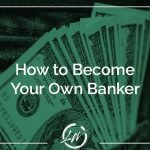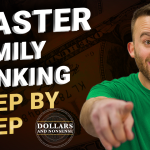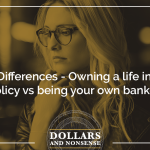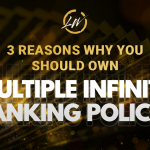In this episode, we will discuss why you need to become your own banker, even if you have no debt.
We’re often asked, “What if I don’t have any debt?” Or “How does Infinite Banking work once I’m out of debt?”
You see, a lot of people have been taught to take loans, and they pay off their loans. And people who follow this line of thinking don’t have any debt.
But what those people don’t understand is that banks make just as much money off your deposits as they do on your loans. So, the reality is you might not have any debt, be making any mortgage payments, loan payments, or even credit card payments, but you are still depositing money into a banking system.
In other words, the bank doesn’t care if you deposit money with them or if you borrow money from them. They just want your money!
The reason why you need to become your own banker is it’s not just about paying off debt; it’s about getting the bank completely out of your money. They are the ones who are conning us into believing that they’re a good place to make money when in reality, they’re the ones making a killing off of you no matter what chair you’re sitting in.
So join us as we deep dive on why you need to become your own banker.
Become Your Own Banker Topics Discussed:
- Common questions about becoming your own banker
- How banks make money both ways
- The tax implications of storing your money in a bank
- The opportunity cost of not becoming your own banker
- Who put your cash to work for you in unconventional ways
- Building personal systems for wealth growth like a bank
- Getting out of debt
- Recapturing the interest you’ve previously paid everyone else
Episode Takeaways:
Want Financial Freedom?
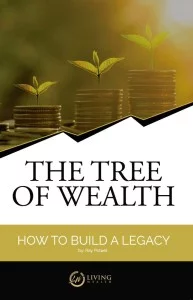
Start your journey to financial freedom with this first step.
Get our 122 page eBook The Tree of Wealth here now.
Podcast transcript for episode 17: Become Your Own Banker
Nate: In this episode, we will discuss why you need to be your own banker, even if you have no debt. She’s Holly and she helps people find financial freedom.
Holly: He’s Nate. He makes sense out of money. This is Dollars and Nonsense. If you follow the herd, you will be slaughtered. Episode 17.
Nate: All right, Holly. So what are the things we get asked … Or I do. I’m sure you do plenty of times by people who are learning about the infinite making concept; things that we teach here at Living Wealth.
One of the first things that they ask is “Hey, what if I don’t have any debt?” Or “How does this work when I’m out of debt?” This whole banking strategy. So, this episode’s really going to be all about why you really do need to be your own banker, even if you have no debt.
Holly: Yeah. And I think one of the points that we need to make is that a lot of people have been taught to take loans and they pay off their loans, they pay off their credit card every month. They really don’t have any debt. But, what they don’t understand is that banks make just as much money off of our deposits as they do on your loans. So really, the reality is you might not have any debt and you might not be making any mortgage payments or loan payments for a car or even credit card payments. But, you are still depositing money into a banking system. Most of us are. We all have a bank that we use or a credit union. As you make those deposits, they are still making money off your money. You’re not making any money when you went and paid cash.
Nate: Right, so I mean, that’s really the main difference between the people who don’t have any debt and the people who do have debt, is that the people who don’t have any debt saved up money to afford the things that the people who do have debt did not have the ability to save up for. Which really means that you essentially put all the money in the bank that these other guys are repaying in their loans. In other words, the bank doesn’t care if you deposit money with them or if you borrow money from them. They really just want your money. So, they need both guys and they make a lot of money off of their depositors, regardless of whether you borrow from them or not.
So, the key is … Why you need to be your own banker is it’s not just about paying off debt, it’s about getting the bank completely out of the picture as much as we can. Because they are the ones who are essentially conning us into believing that they’re a good place to make money, when in reality, they’re the ones making a killing off of you no matter what chair you’re sitting in.
Holly: And reality is, as we save that money Nate … Most of us, if not all of us, we put it in a bank. We put it in a savings account. We’re saving up for that car. We’re saving up for that vacation. We’re saving up for that down payment on a house. So, what are we doing with that money? We’re putting it someplace safe, where we hope we’re not going to spend it. So, really if we have to do one more step, it doesn’t normally go in our house or under our mattress because it would be too easy to access it. But, what we tend to do is put it in to a savings account or something that’s giving us a little bit of interest so that when we go and we need the money we can pull it out. While we do that, the bank will …. Like you said, they’re just using that money. They’re loving the fact that you’re the depositor and they’re able to loan that money out to somebody else in the form of a loan.
Nate: Yeah, so if they had no depositors, they wouldn’t be able to make any loans. So, they like you if you have deposits. They like you if you have loans with them. They really don’t mind which one you are. They just want to get your money. It’s a key element.
A lot of people, whenever they hear our concept they say “Okay, these people helped me get out of debt; helped me reduce the interest I’m paying.” All of that’s great, but that is really only half of the equation when you’re dealing with the banking world.
So, if we’re really teaching people how to become their own banker, we need to not only show them ways that they can cut out the interest expense that they have, but also they need to start depositing money that actually profits them instead of profits shareholders of a bank and you don’t really get to see any of it.
Holly: And I think they key there, too, is even as we’re making those deposits in the bank, yes, we’re getting a little bit of interest off that. But, we’re also going to get taxed on that interest growth as well. So, wouldn’t you rather put it into a system, if you are going to be making those deposits, that you’re actually going to be able to grow tax free versus “by the way, not only the money the banks give me for putting my deposits in there, now I get to give that back to the government as well.”
Nate: Yeah, the dollar that we made in the savings account, we pay taxes on. So, they make just as much money. That’s the whole point of using the policy is to get out of there. We get to use it just like a bank account, but be tax free.
One of the first steps is banking is two fold. Banking has to do with deposits and with loans. Many people just see it as the loan portion, which is half the equation, but you want to solve for the entire banking equation to profit on both. So, recapture all the interest on every loan that you normally would have taken with a bank and also recapture all the profits that they’ve been making off your deposits ever since you’ve been a customer with them. If we can do both of that, you’re going to be in pretty good shape.
The first point of why you need to be your own banker even if you have no debt is that banks make just as much money off of your deposits as they do on your loans. They need both of you guys. So, even if you have no debt, you have a lot of money that’s left on the table. But, the second point really has to do with opportunity cost. Holly, what most people don’t realize is that you really do finance everything that you buy. You either pay interest when you borrow somebody else’s money, or you give up interest that you could have earned when you pay with cash. You either pay up, or you give up. But, either way, you’re going to be losing interest that you could have kept of could have earned.
Holly: Yeah, another way of looking at that too, Nate, is the fact of that we have never really considered the fact that every payment we make, whether that be the cash payment for a car or doing a loan with a car, that basically when we paid the cash for that car we lost the growth of that cash. We lost the interest it could produce. We gave it to somebody else to earn. When we finance the car, we basically are giving the interest to them as well. So, we lose it in both ways.
For the car, if we paid cash, we went and paid cash for it. The dealership gets to make money off that by the interest that they’re going to get. What we did is buy an asset that as soon as we drove it off the car lot became depreciating asset. If you change your mindset, you can actually change it into an appreciating asset.
Nate: Yeah, not a lot of people bring in opportunity cost into their system. I wouldn’t necessarily tell you to, but a lot of people who don’t have any debt are actually using a lot of money due to opportunity cost. Which, really, money that you could earn if you actually put money to work in a better place. It’s easily what opportunity cost is. A lot of time, when you pay cash for things, you’re missing out on all the interest that it could have earned. That’s one of the secrets; one of the powers of using the dividend paying whole life policy that we teach people to use to finance things. It’s one of the only places in the world that still grows even when you use it. So, you don’t even have that opportunity cost lost like most people would when paying cash, because you can leverage your money and have it still grow even while you’re using it to finance a car or a vacation or something like that. That’s extremely powerful over time being able to get all those gains that normally people just give us by writing the check.
Holly: Yeah, I mean, it’s the simplicity of instead of having made the deposits into the bank, you made those deposits until you could save up to go and buy that car. Instead, you made the deposits into your life insurance policy. And when you had enough money to purchase the car, you took it out of the policy. The beauty of that is that that money does grow. It still grows because you’ve borrowed the money from the life insurance company.
So, like Nate said, the key here is that this is the only product the dividend paying mutual life insurance is the only product in the world that works that way. That you can actually put money in and take a loan out and actually have money continue to grow.
Nate: And so we can actually bypass the opportunity cost that we lose whenever we used to pay cash, we can actually recapture that. Which, as we said, can amount to an incredible amount. So, even if you have no debt, first off the banks are making a ton of money off you anyway because you’re one of their favorite customers. That’s why they treat you so nice when you walk in because you’re the one with all the deposits.
Holly: Yeah. How can I help you today?
Nate: Exactly. Hey, come on in. And then the opportunity cost is paying cash where every time you write the check, you’re losing money that you used to have that you could have earned money with that’s now just gone forever. So, if you were the banker and really learned about leveraging, you could actually continue to earn money with that money. That’s what we like to show people how to do with this whole banking strategy. The third point we really wanted to make … We should probably make that after we go to break. So, you can get a quick message from living wealth and we’ll finish and wrap up with the third point on why you need to be your own bank even if you have no debt.
Holly: Are you tired of being stressed about money? The Dollars and Nonsense podcast is sponsored by Living Wealth. Visit Livingwealth.com/freedom to get your free smart money e-book and sign up for a personal wealth presentation today. Living Wealth is a family owned and operated business, which works with individuals, families, and even businesses to slay the money stress dragon. Our clients receive individual coaching regarding wealth creation and how to create a retirement income. You’ll be enabled to have cash today and in the future. Since 1972, Living Wealth has been committed to educating smart people on basic money principals. To assist them in becoming debt free and finally find financial freedom. Let us help set you free. Remember to visit livingwealth.com/freedom to receive your free e-book and even sign up for an individual wealth presentation today.
Welcome back to Dollars and Nonsense. Before you left, we were talking about why you need to be your own banker even if you have no debt. We made our first and second point. We’re going to get right into the third point. And what is the third point, Nate?
Nate: The third point is that when most people … And it’s a question I like to ask quite a bit. Most people do not have a system. Now, banks work on systems, so they many have no debt, but a common question I ask people is “Okay, you may have no debt. You may have paid cash for your last few cars.” I normally ask “How much of the money do you have from all the cars you bought in your lifetime? You could have paid cash for every single car you’ve ever bought. How much of the money do you have from all the cars?” And you know what answer I get every time? None. I don’t have any of the money. And you know what’s funny is I get the same answer from everybody who financed all their cars. I ask them “Well, how much of the money do you have?” They say “None. I paid it all to the bank.”
Either way, we got one guy who paid cash, who doesn’t really doesn’t have any money from all the cars. It’s a zero sum game we like to call it. He saves up, he spends. He saves up, he spends. He saves up, he spends. He ends up with nothing at the end of the day except for the used car. Same thing for the guy who financed. He just doesn’t save up ever. He just goes and gets the loan, and then pays it back. Gets the loan and pays it back. They each really do the same thing and they both end up with nothing. So, if you have no more than the guy who financed his cars, did it really do you any good? That’s why the key is you’ve got to have a system in place that you can actually utilize to not only get all the money back for the cars, but also make a profit so that money doesn’t just disappear. I don’t know where it went. You don’t know where it went. But whatever. It’s not with you. Or else, you’d have a lot more money than you do now.
Holly: And Nate, most of us, even when we pay cash for something really we tend to not have a systematic approach for how we’re going to save for that next item we’re going to purchase. What I mean by that is if I go and pay cash for a car today, I know in the future I’m going to need another car, right? The car’s not going to last forever. But, typically I’m not putting money aside every week or every month to save up for that next car. What I’m doing is when I get a little extra money, I’m putting it into that savings account. Or I’m making a deposit so that when I have to go buy that next car, I have the money. There’s not a systematic approach. Most of us can’t get anywhere if there’s not some systematic approach to achieving what we want such as saving up for the down payment on a house. You either do it systematically, or you don’t do it at all. The person that financed the car is being forced to do it systematically because they’re having to pay the bank for the company that gave them the loan for the car. That’s what we mean by having a system.
You have to have a system in place because we are going to save up for that next purchase. We need to know what it is. But most of us that are going to pay cash, aren’t going to do that in a systematic approach.
Nate: Yeah, so the bank requires you to repay them on a systematic basis when you borrow money. When you pay cash, there’s no one telling you what you can and can’t do. Many people don’t really have this systematic approach as you would say, Holly, to make sure that they have the money next time. It just kind of happens. But, whenever it just kind of happens, the issue is you normally don’t have more than enough. You just have barely what you need or you have to go down grade or something because you didn’t actually have what you need. All we’re really trying to say is I know a lot of people who have no debt, but don’t have any money. What good is it?
It would be great if you had no debt, had some money. And that’s great. There’s plenty of people out there like that, but as far we’re concerned they say “Why do I need to be my own banker?” Well, there’s a lot of reason. We’ve already laid three out.
Number one, banks make just as much money off your deposits as they do on your loans. So, may as well find a way to start making what you should be on your money that banks just won’t ever pay you.
The second one is opportunity cost. You really do finance everything you buy. So either way, you’re actually losing money and we have a way to recapture that opportunity cost by having our money work for us all the time. It’s very powerful.
Lastly, if you don’t have any money from all the cars you’ve bought in your life or the vacations you’ve took or anything like that. I’ll tell you the truth, the guy who financed everything doesn’t have any money from those either. So, unless you have a system that helps you achieve wealth building, then it’s going to be very hard to do it just off the seat off your pants.
Holly: I think, Nate, too the matter of creating the system means that you have a systematic approach to being able to save up for that next item you need to purchase versus having to settle for when you don’t have enough money to buy it. Having to settle for something else instead because you didn’t have a system. So, instead of a new car, maybe you buy a used car. Or, for that rainy day fund, you’ve had to use that money to pay for something else instead and then you maybe couldn’t go on that vacation. If you would view it from a systematic approach of I want to be able to leave wealth and build wealth. The only way to you can build and create wealth is through a system.
You may have no debt, but you can be poor still. Or, what we call asset rich and have no cash. Which means, unless you sell something or trade it in or do something else, you can’t go afford that next vacation or that next car unless you have a systematic approach. Really, it brings discipline into your life, too, just in regards to … Most of us, when we bought our house, we didn’t pay cash for it. We financed it or had a mortgage on the house. And then when its all said and done and you actually pay off that mortgage, then you’re saving up for that next thing.
We’ve been taught a system to do that. The beauty of that is that instead of giving that money to the bank that makes the money off your deposits just as they do off your loans. Instead, you’re able to bring that money back to you. That creates your own wealth system. We would just love to be able to create your own wealth system even if you have no debt. Having no debt isn’t always a great thing because you basically might not have any money even though you have no debt.
Nate: You know, our whole goal is to not have any debt. That was one of the other questions as well that comes up that maybe we could expound on real quick before we close-out here, which is … Some people who look into our concept say “Well, I understand how it works while I’m in debt and getting out of it and starting to recapture it. But, then what?” They kind of miss the whole purpose of doing this is that it’s always two fold. We’re trying to solve for both the banking issues.
The first is the amount of interest people are losing every year on car loans, student loans, credit cards, mortgages and the like. That is getting astronomical in people’s lives. If you would just recapture that and become your own banker, that’s great. But if you look at all the money that you’re losing to the bank shareholders because they’re not paying you anything for your deposits, it’s just as big.
So, one of the things that you always have to do, whether you’re in debt not or not; or whether you’ll soon be out of debt by using our system, you need to understand that always you are solving for both pieces of the puzzle I the banking world; the depositor and the lender.
Holly: Key there; depositor and the lender. What if you could be both? I mean, really, having no debt and being able to actually be both the lender and making the interest off that. So, you’re making money off the deposit you’re making and you’re making money by financing your vehicles through yourself versus the bank. I mean, the banks not going to love you so much if you don’t keep depositing all that money in there. Or, they don’t love you so much if you don’t keep taking out loans, right? It’s amazing if you got a lot of loans with them or credit cards with them or you have a lot of deposits with them, it’s amazing how they treat you when you walk in the door because they need your money.
Just that reality; they have to have your money in order to survive. They have to have depositors. Well, if you could create your own banking system and you are the depositor, then you’ve created a win for you and your family.
Nate: Yeah, definitely. Recap. One more time. Banks make just as much money off of your deposits as they do on your loans. We’re solving for both. Not just those that are in debt and paying interest, but those who are losing a ton of interest that they should be earning.
Opportunity cost. Many times people when they pay cash … Because you don’t have any debt, you’ve gotta be paying cash. You’re losing all the money that that cash could have earned you and you can actually recapture that thought this whole process of becoming your own banker because you can make money, even whenever you’ve borrowed it out of the policy, which is really powerful.
Lastly, you’ve got to start recapturing the money for the things you’re paying cash for. If you haven’t been doing that, then there is a way to do it. You just may need to get into a systematic approach and you can actually accomplish it.
That’s one of the things we try to help people see is really to be your own banker. Treat your money like a bank. So, this has been Dollars and Nonsense. If you follow the herd, you will get slaughtered.
Holly: Get free resources and transcripts from this episode by visiting Livingwealth.com/e17.






